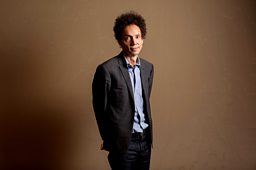Malcolm Gladwell: Eight things we learned when he spoke to Kirsty Young
In her Βι¶ΉΤΌΕΔ Radio 4 podcast Young Again, journalist and broadcaster Kirsty Young asks fascinating people what advice they would like to give their younger self.
Malcolm Gladwell has built his career on trying to understand why humans behave the way we do. First as a journalist, then as an author and podcaster, Gladwell’s work turns often very complex sociological questions into understandable narratives. He speaks to Kirsty about his unusual childhood, why he rarely worries, and becoming a father at almost 60. Here are eight things we learned.
-
![]()
Young Again: Listen to this episode on Βι¶ΉΤΌΕΔ Sounds
Young Again: What advice would Malcolm Gladwell give to his younger self?

1. His parents were ahead of their time
Malcolm was born in England to a British father and a Jamaican mother. He describes his father as “a preposterously wonderful version of the English – he loved to garden; he loved taking long walks with his dogs; he didn’t talk about his feelings; he read Dickens and cried.”
The thing I loved most about my father was that he was someone who felt no desire to fit in. In fact, he delighted in being the odd person out.
He describes his mother as being “anglicised middle-class Jamaican. You can’t understand Jamaica unless you understand how deeply rooted English colonial culture was.” His parents, although from very different countries, shared a lot of cultural ground. Malcolm says they organically instilled in him the belief that you should judge people on character, not appearance. “They didn’t perceive there to be this huge cultural gap between them,” he says. “The fact that there were different colours was not terribly significant in their eyes… They had this 21st-century notion of ‘Don’t get hung up just because someone’s skin is darker’… They’re just merely ahead of their time.”
2. He grew up without a TV, in a community without cars
“We didn’t have a television,” says Malcolm of his childhood. “We didn’t go to the movies very often. Once you’ve made those two decisions in the 1970s and 1980s, you’re defining yourself. I had an understanding of popular culture. I just wasn’t a participant.”
Malcolm grew up in Canada, in a community of Mennonites, a religious order whom Gladwell describes as having an “ethic of modesty”. There are different types, but Gladwell’s neighbours were “old order Mennonites, who basically have rejected the 20th century, so they don’t have electricity and they drive horses and buggies.”
3. He enjoys being distinctive
When asked how he felt about growing up in a way that was different from most children, Malcolm says, “I was quite proud of it. I liked the distinctiveness. The thing I loved most about my father was that he was someone who felt no desire to fit in. In fact, he delighted in being the odd person out.”
He goes on: “I thought it was fantastic [to be different]… In my mind, my father had a definition of what it meant to be a Gladwell: a Gladwell was someone who went their own way.”
4. He wanted to work in advertising to tell stories
As a young man, Gladwell tried to get a job in advertising. “I think telling a story in… 60 seconds is just the greatest,” he says. “Storytelling is only interesting if there are constraints. If there are no constraints, what’s the point?... The ultimate restraint is you have to tell your story in 60 seconds. When someone pulls it off, I’m in awe.”
He applied to many places and was unsuccessful, but undeterred. “I thought it was hilarious,” he says. “As the rejection letters came in, I put them on the wall in my dorm room… It became kind of a joke.” He figured if it didn’t work out, something else would happen. “I’m an optimist. If you combine optimism with a feeling that the stakes are low, you don’t have disappointment.”
5. He's not one for complaining
Malcolm repeatedly insists that he’s never had anything that he considers a “bump” in his career: “Sometimes it works, sometimes it doesn’t. I don’t fret about it.” As he sees it, he has little to gripe about. “I am an educated Canadian male born in 1963. The entire world is set up for me to succeed. I don’t understand people in my situation who aren’t like me. Are you kidding me? Every single institution and bias was set up to make educated western males born in the ’60s succeed. If you didn’t get the memo, there’s something wrong with you.”

Why the world needs disagreeable people
Author Malcolm Gladwell says maintaining the status quo is not always a good thing.
6. The biggest benefit of success was relaxing
Malcolm says he didn’t see huge changes in his life when The Tipping Point, his book about how things become culturally popular, became a hit. “The way in which it changes your life is you realise you have an audience,” he says. “You realise you’re getting freedom. When you’re anxious about an audience, you spend a lot of time trying to calibrate what you’re saying… You’re trying to find a formula that works with an audience. Once you’ve had a success, you can relax. Now I can do what I want, because I’ve been validated… That’s the way in which it affected my life. It gave me the freedom to do what I, by nature, wanted to do, which was to experiment and make mischief and challenge things.”
7. He'd like to be the fastest runner
Malcolm’s book Outliers suggested that you can master anything by practising it for 10,000 hours. Given that time, he knows how he’d use it. “I’d love to spend the next 10 years trying to be the fastest runner in my age group that I could possibly be. I think that would be fantastic.”
8. He became a dad at 58
Asked the best decision he’s ever made, Malcolm says, “To have children”. Asked his worst, he says, “To delay having children”. Malcolm became a father at 58. He’s now 61.
“There are good things to being an elderly parent,” he says. “You know who you are. Your life is settled. If I had children in my twenties, it would have been a disaster. I was all over the place. The only bad thing is I’ll be 80 when they’re in their twenties. It just seems sad I’ll miss most of their lives.” Asked what children have brought to his life, Malcolm laughs. “Free content”.






